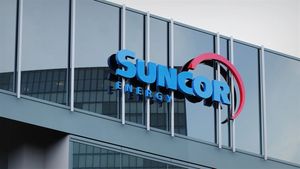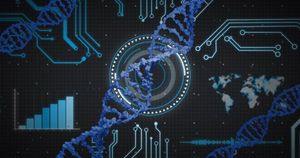Financial News
Datopotamab Deruxtecan Demonstrated Statistically Significant and Clinically Meaningful Progression-Free Survival Benefit in Patients with HR Positive, HER2 Low or Negative Breast Cancer in TROPION-Breast01 Phase 3 Trial
- First phase 3 results in breast cancer for Daiichi Sankyo and AstraZeneca’s datopotamab deruxtecan
- Plans for global regulatory submissions are underway
Positive topline results from the TROPION-Breast01 phase 3 trial showed datopotamab deruxtecan (Dato-DXd) demonstrated a statistically significant and clinically meaningful improvement for the primary endpoint of progression-free survival (PFS) compared to investigator’s choice of chemotherapy in patients with inoperable or metastatic hormone receptor (HR) positive, HER2 low or negative (IHC 0, IHC 1+ or IHC 2+/ISH-) breast cancer previously treated with endocrine-based therapy and at least one systemic therapy.
Datopotamab deruxtecan is a specifically engineered TROP2 directed DXd antibody drug conjugate (ADC) being jointly developed by Daiichi Sankyo (TSE: 4568) and AstraZeneca (LSE/STO/Nasdaq: AZN).
Data for the dual primary endpoint of overall survival (OS) were not mature at this interim analysis and the trial will continue as planned to assess OS.
The safety profile of datopotamab deruxtecan was consistent with previous clinical trials in breast cancer with no new safety signals identified. All grade interstitial lung disease rates were low.
More than two million people worldwide are diagnosed with breast cancer each year.1 HR positive, HER2 low or negative breast cancer is the most common subtype, accounting for more than 65% of diagnosed cases.1,2 Standard initial treatment for these patients is endocrine therapy but most patients with advanced disease will develop resistance, underscoring the need for additional options.3,4 TROP2 is a protein broadly expressed in HR positive, HER2 low or negative breast cancer.5,6
“The positive topline results from TROPION-Breast01 demonstrate the potential for datopotamab deruxtecan to become an important treatment option for patients with HR positive, HER2 low or negative breast cancer in the second-line metastatic setting,” said Ken Takeshita, MD, Global Head, R&D, Daiichi Sankyo. “We look forward to realizing the full potential of this TROP2 directed antibody drug conjugate across breast cancer subtypes through our ongoing phase 3 program, including two trials in patients with triple negative breast cancer.”
“Today’s TROPION-Breast01 news is a significant development for patients with HR positive, HER2 low or negative metastatic breast cancer whose tumors have become insensitive to endocrine therapy and who currently face poor outcomes,” said Susan Galbraith, MBBChir, PhD, Executive Vice President, Oncology R&D, AstraZeneca. “We are encouraged by these positive results.”
Detailed results from the TROPION-Breast01 trial will be presented at an upcoming medical meeting and shared with regulatory authorities.
Daiichi Sankyo and AstraZeneca have two additional phase 3 trials evaluating datopotamab deruxtecan in breast cancer. TROPION-Breast02 is comparing datopotamab deruxtecan to chemotherapy in patients with previously untreated locally recurrent inoperable or metastatic triple negative breast cancer (TNBC) who are not candidates for anti-PDL1 therapy. TROPION-Breast03 is evaluating datopotamab deruxtecan with and without durvalumab versus investigator’s choice of therapy in patients with stage I-III TNBC with residual disease after neoadjuvant therapy.
About TROPION-Breast01
TROPION-Breast01 is global, randomized, multicenter, open-label phase 3 trial evaluating the safety and efficacy of datopotamab deruxtecan versus investigator’s choice of single-agent chemotherapy (eribulin, capecitabine, vinorelbine or gemcitabine) in patients with inoperable or metastatic HR positive, HER2 low or negative (IHC 0, IHC 1+ or IHC 2+/ISH-) breast cancer who have progressed on or are not suitable for endocrine therapy per investigator assessment and at least one systemic therapy.
The dual primary endpoints of TROPION-Breast01 are PFS as assessed by blinded independent central review (BICR) and OS. Key secondary endpoints include objective response rate, duration of response, investigator assessed PFS, disease control rate and time to first subsequent therapy.
TROPION-Breast01 enrolled more than 700 patients at sites in Asia, Europe, North America, South America and Africa. For more information visit ClinicalTrials.gov.
About HR Positive, HER2 Low or Negative Breast Cancer
Breast cancer is the most common cancer in the world and a leading cause of cancer-related death.1 More than two million breast cancer cases were diagnosed in 2020 with nearly 685,000 deaths globally.1
Breast cancer is considered HR positive, HER2 low or negative when tumors test positive for estrogen and/or progesterone hormone receptors and negative for HER2 (measured as HER2 score of IHC 0, IHC 1+ or IHC 2+/ISH-).2,7 HR positive, HER2 low or negative breast cancer is the most common subtype, accounting for more than 65% of diagnosed cases.2 Approximately 30% of patients diagnosed with HR positive, HER2 low or negative metastatic breast cancer are expected to live five years after their diagnosis.2
TROP2 is a protein broadly expressed in several solid tumors, including HR positive, HER2 low or negative breast cancer.5 TROP2 expression is associated with increased tumor progression and poor survival in patients with breast cancer.5,6
About the Daiichi Sankyo and AstraZeneca Collaboration
Daiichi Sankyo and AstraZeneca entered into a global collaboration to jointly develop and commercialize ENHERTU in March 2019 and datopotamab deruxtecan in July 2020, except in Japan where Daiichi Sankyo maintains exclusive rights for each ADC. Daiichi Sankyo is responsible for the manufacturing and supply of ENHERTU and datopotamab deruxtecan.
About Datopotamab Deruxtecan (Dato-DXd)
Datopotamab deruxtecan (Dato-DXd) is an investigational TROP2 directed ADC. Designed using Daiichi Sankyo’s proprietary DXd ADC technology, datopotamab deruxtecan is one of six ADCs in the oncology pipeline of Daiichi Sankyo, and one of the most advanced programs in AstraZeneca’s ADC scientific platform. Datopotamab deruxtecan is comprised of a humanized anti-TROP2 IgG1 monoclonal antibody, developed in collaboration with Sapporo Medical University, attached to a number of topoisomerase I inhibitor payloads (an exatecan derivative, DXd) via tetrapeptide-based cleavable linkers.
A comprehensive development program called TROPION is underway globally with more than 12 trials evaluating the efficacy and safety of datopotamab deruxtecan across multiple tumors, including non-small cell lung cancer, TNBC and HR positive, HER2 low or negative breast cancer. Beyond the TROPION program, datopotamab deruxtecan also is being evaluated in novel combinations in several ongoing trials.
About the DXd ADC Portfolio of Daiichi Sankyo
The DXd ADC portfolio of Daiichi Sankyo currently consists of six ADCs in clinical development across multiple types of cancer. ENHERTU, a HER2 directed ADC, and datopotamab deruxtecan (Dato-DXd), a TROP2 directed ADC, are being jointly developed and commercialized globally with AstraZeneca. Four additional Daiichi Sankyo DXd ADCs include patritumab deruxtecan (HER3-DXd), a HER3 directed ADC, ifinatamab deruxtecan (I-DXd; DS-7300), a B7-H3 directed ADC, raludotatug deruxtecan (R-DXd; DS-6000), a CDH6 directed ADC, and DS-3939, a TA-MUC1 directed ADC.
Designed using Daiichi Sankyo’s proprietary DXd ADC technology to target and deliver a cytotoxic payload inside cancer cells that express a specific cell surface antigen, each ADC consists of a monoclonal antibody attached to a number of topoisomerase I inhibitor payloads (an exatecan derivative, DXd) via tetrapeptide-based cleavable linkers.
Datopotamab deruxtecan, ifinatamab deruxtecan, patritumab deruxtecan, raludotatug deruxtecan and DS-3939 are investigational medicines that have not been approved for any indication in any country. Safety and efficacy have not been established.
About Daiichi Sankyo
Daiichi Sankyo is an innovative global healthcare company contributing to the sustainable development of society that discovers, develops and delivers new standards of care to enrich the quality of life around the world. With more than 120 years of experience, Daiichi Sankyo leverages its world-class science and technology to create new modalities and innovative medicines for people with cancer, cardiovascular and other diseases with high unmet medical need. For more information, please visit www.daiichisankyo.com.
References
1 Sung H, et al. CA Cancer J Clin. 2021;10.3322/caac.21660.
2 National Cancer Institute. SEER cancer stat facts: female breast cancer subtypes. Accessed September 2023.
3 Lin M, et al. J Cancer. 2020; 10.7150/jca.48944.
4 Lloyd M R, et al. Clin Cancer Res. 2022; 28(5):821-30.
5 Goldenberg D, et al. Oncotarget. 2018;9(48): 28989-29006.
6 Vidula N, et al. Breast Cancer Res Treat. 2022 Aug;194(3):569-575.
7 Iqbal et al. Mol Biol Int. 2014;852748.
View source version on businesswire.com: https://www.businesswire.com/news/home/20230921449877/en/
Contacts
Global/US:
Jennifer Brennan
Daiichi Sankyo, Inc.
jbrennan2@dsi.com
+1 908 900 3183 (mobile)
Japan:
Koji Ogiwara
Daiichi Sankyo Co., Ltd.
ogiwara.koji.ay@daiichisankyo.co.jp
+81 3 6225 1126 (office)
Investor Relations Contact:
DaiichiSankyoIR@daiichisankyo.co.jp
More News
View More





Quotes delayed at least 20 minutes.
By accessing this page, you agree to the following
Privacy Policy and Terms Of Service.



